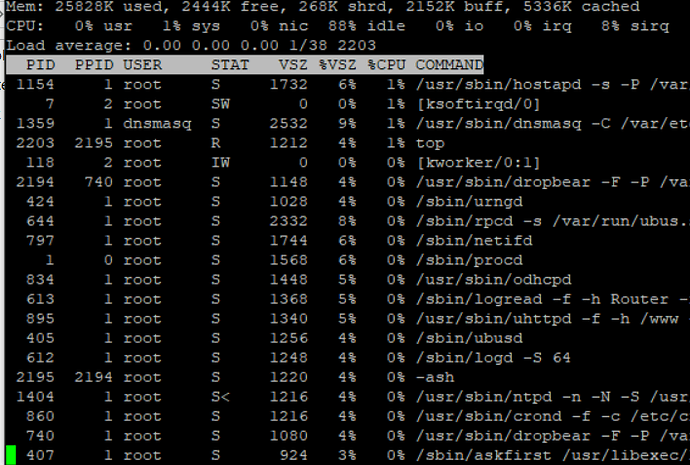For my travel router I'm trying different versions between 18.06.8 and 19.07.3 with LuCI. In addition to the router's info, I run a script via crontab, with logging to an external server (by UDP), but I think logd is (set to) "too chatty" for what I want.
Trying to reduce the information I don't want, I already set:
- Log output level to Emergency,
- Cron Log Level to Normal,
- suppress dhcp log,
- hostapd logger level = 4
But logd still sends many AP-STA connections/disconnections entries,
and USER root pid **** cmd my_script.sh crontab execute entries.
(I tried redirecting the stdout of the cron job, but it also suppress what I do want to log.)
I would like to:
- get rid of those unwanted messages,
- Optional: report the router's IP address (ideally, the current public WAN IP address) instead ot the router name
Shall I tweak other settings, or shall I replace logd with something more powerful, like syslog-ng3 or rsyslog or other? and how? I already read several wiki pages, but I still don't get whether LuCI will deal with this (at least with what I've already done) or I shall do everything by scripts.
on a 'travel router', for just source exclusions, go the script route... additional logging daemons chew cycles.
Indeed. Memory too: on my openwrt, syslog-ng has a resident physical memory size of 7.6M compared to logd of 2.4MB
Maybe other log daemons requires more resources than logd, I don't know. This Trendnet is a 8MB/32MB 360MHz single-port device. The main constraint for me is the free RAM: between 1MB and 7MB, deppending on the build and packages installed.
Could you please be more specific? which script, and what key to look?
ssh root@ROUTERIP "logread -f | grep -vE '(my_script.sh|AP-STA)'" | tee -a /tmp/router.log | nc -v -u -w 0 LOGSERVER 514
A little progress:
- On another thread I found that setting cronloglevel = 9 (or higher) suppress the log entry for the cronjob start. After some troubleshooting, now my script run it's ok
- The interesting approach suggested by @anon50098793 requires installing the full netcat package. After that, the following commandline seems to have the right syntax (at least via cli):
logread -f | grep -vE '(wlan0|AP-STA)' | tee -a /tmp/router.log | nc -v -u LOGSERVER PORT
Now I wonder where to run that, because it's a resident task: I don't know whether running it at the end of rc.local (startup) script would cause any trouble? Maybe creating an script and running like a init.d service? or better finding and replacing the call of the running logread process? Or somewhere else?
I'm updating this thread as I moved to a more capable router (dual band MediaTek MT7628AN - based) and upgraded to OpenWrt 19.07.7, and I keep aiming at the same goal: to minimize what logd reports to the external server.
After factory reset, setting:
Log output level = Emergency
Cron Log Level = Warning
Suppress logging for DHCP and DNS
seems to be OK from my log viewpoint.
But after installing luci-app-nft-qos, and later add an static DHCP lease, it begin to report several DHCP messages, such as:
mm-dd hh:mm:ss [routername] ACTION=add, MACADDR=ab:cd:ef:12:34:56, IPADDR=[192.168.x.y], HOSTNAME=
mm-dd hh:mm:ss [routername] ACTION=update, MACADDR=ab:cd:ef:12:34:56, IPADDR=[192.168.x.y], HOSTNAME=something
Even after removing all the static IP leases, it still logs this kind of messages as the clients connects/disconnects, which I would like to suppress.
Any suggestions?
1 Like
at this point... you would really be best to send everything to a full syslog server...
there it is possible to perform all sorts of sorting/formatting/splitting of log messages...
if your stuck on low resource router level 'hacks'... just send your logread through a function with multiple 'grep -v' before 'nc'...
all depends on what resources are available...(and where)
you may wish to throw it all in a script... then checkout procd-init.d files or maybe the 'pservice' package...
Indeed I already have been filtering the sta messages at the syslog server, but I keep wondering what could be improved at the router level.
well... here is a small snippet from something i'm doing that may or may not be of use...
logfilter() {
while read FISH; do
case "${FISH}" in
*"successfully loaded"*) :; ;; #collectdrubbush
#*"Exiting normally."*) :; ;; #collectdrubbush
*) echo $FISH; ;;
esac
done
}
logread | logfilter > /tmp/LOG
nLINES=$(sed 'H;/LOGSAVED/h;$!d;x' /tmp/LOG | grep -v 'LOGSAVED' | wc -l)
sed 'H;/LOGSAVED/h;$!d;x' /tmp/LOG | grep -v 'LOGSAVED' >> "${OUTFILE}"
logger LOGSAVED
rm /tmp/LOG 2>/dev/null
( you would change the area near OUTFILE to 'nc' for your purposes )
( its coded with cron in mind... hence the 'LOGSAVED' markers... )
1 Like
